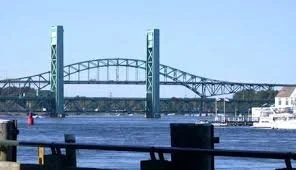The Piscataqua River Bridge, which connects Portsmouth, N.H., and Kittery, Maine, and on E.B. White’s route from New York City, where he worked off and on for decades.
“What happens to me when I cross the Piscataqua and plunge rapidly into Maine at a cost of seventy-five cents in tolls? I cannot describe it. I do not ordinarily spy a partridge in a pear tree, or three French hens, but I do have the sensation of having received a gift from a true love. And when, five hours later, I dip down across the Narramissic and look back at the tiny town of Orland, the white spire of its church against the pale-red sky stirs me in a way that Chartres could never do. It was the Narramissic that once received as fine a lyrical tribute as was ever paid to a river—a line in a poem by a schoolboy, who wrote of it, ‘It flows through Orland every day.’ I never cross that mild stream without thinking of his testimonial to the constancy, the dependability of small, familiar rivers.”
E.B. White in “Home-Coming,’’ in Essays of E.B. White (1899-1985) (Harper & Row, 1977). He was a famed essayist and author of the children’s books Charlotte’s Web and Stuart Little. He and his wife had a small farm in Brooklin, Maine, on the Blue Hill Peninsula, first as a summer place and then mostly year-round.
The Rockbound Chapel, in Brooklin.
The book was inspired by White’s life on his farm in Brooklin.












